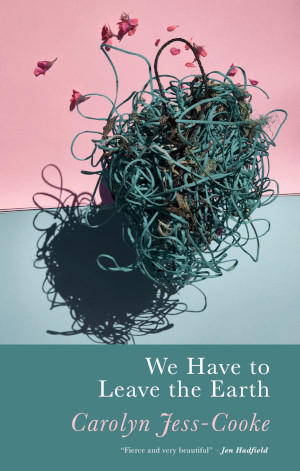 Book Balm recommendation: Read to immerse yourself in wonder.
Book Balm recommendation: Read to immerse yourself in wonder.
The contents page of Carolyn Jess-Cooke‘s third collection offers a clear indication of the skill at play here. Poem titles are mini-masterworks, with each offering sense of perilous climatic times we live in couple with an awe for the world we inhabit.
Section 1, Songs for the Arctic, illuminates scenes by scattering words across the whiteness of the page. in We Flicker too briefly, you can roll the flavour of the lines over your tongue: “Bone sky./Ocean’s oil-dark/cloth unsettled” and “green sky-rivers/ arrows of geese/ water scythes of whales.”
Section 2 opens with the title poem, which sets the tone for a sequence about beauty and strength in fragility. In Birdsong for a Breakdown, we’re introduced to the extremity of sensations experienced through the rawness of mental ill-health: “Because sweetness amidst such unnameable dark/ is magnesium, too bright to miss.”
Abutting this, Things Will Work Out’ is a resolutely hopeful four stanza poem: “Somewhere/ beyond here, a river is bending to velvety stones/ along the bank, listening to their news.”
In this section, Jess-Cooke also examines her own fears and dreams for her autistic daughter, and the experts who pigeon-holed them both: “who am I but her mother, a witness”. It’s a theme that rings throughout the collection, asking whether it is enough to see and share what we’ve seen with others, when so much must be achieved if life is not to be lost.
Section 3, The House of Rest, explores this further. It comprises a series of nine poems capturing the grief, resolve and courage of Josephine Butler (1828-1906) who prevented the traumas of countless hundreds by campaigning for the repeal of a law that allowed the incarceration and violation of any woman suspected of carrying a contagious disease. The telling is heartfelt, forthright and striking, not least in the early poems illuminating the loss of Butler’s daughter: “What small offerings we make/ to the things we cannot keep/ as though we might bid them stay/ a little longer, or fool ourselves/ that love and time can be tethered.”
Again, the space on the page works in harmony with the words painstakingly crafted to allow room for our own responses to well up.
Section 4 carries us back to anxiety for the state of the world, reflecting deep feelings for nature, family and the responsibility of the latter to the former as the poet attempts to explain the climate crisis to her children: “We let the ice caps powder – /so pile up the neuron stars/ like old office chairs.”
The blend of heavenly and prosaic is glorious and terrifying.
Thwaites takes this a swoop further, giving voice to an unnamed power: “imma tell you there’s a hole in me/ yup where my belly used to be/ enough to lift the seas ten feet/ if you don’t drown you’re a refugee.”
Stripping back punctation and leaving you to decide whether this may be the voice of the Earth itself, this is a powerful, visceral warning that wriggles through the collection, and one we surely should heed.
From the personal to the global, Jess-Cooke deftly draws our concerns in line with her own, providing visually-rich word-paintings that tell us not only the facts as she observes them, but cutting us cleanly to the emotional quick. The scope of the writing is humbling and hopeful.
This is a collection full of reverence for our planet, and our humanity – an urging to take stock and take action to do all we can to preserve them.
We Have to Leave the Earth by Carolyn Jess-Cooke is published by Seren Books and available to buy here.
This book was given to me in exchange for a fair review.
What are you reading? I’d love to know. I’m always happy to receive reviews of books, art, theatre and film. To submit or suggest a book review, please send an email to judydarley (at) iCloud.com.
